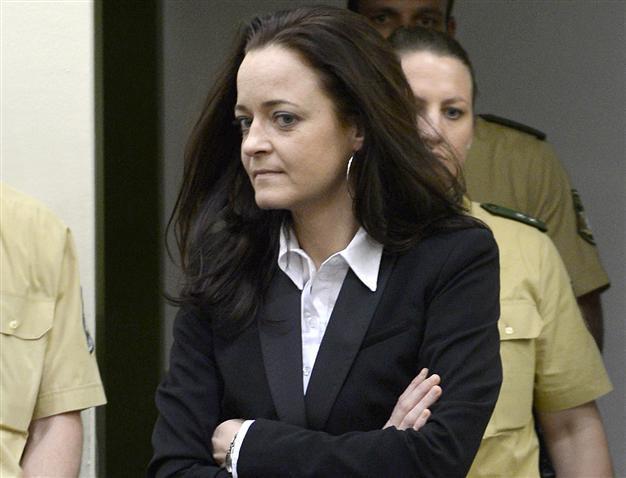German woman in dock in landmark neo-Nazi murder trial
MUNICH - Agence France-Presse

Beate Zschaepe who is charged with complicity in the murders of eight ethnic Turks, a Greek immigrant and a German policewoman between 2000 and 2007 as a founding member and sole survivor of the far-right gang dubbed the National Socialist Underground (NSU), enters the courtroom prior to the start of her trial at a Munich courthouse, southern Germany, on May 6, 2013. AFP Photo
A woman accused of being at the heart of a neo-Nazi killer cell went on trial on May 6 in a case that has shocked and shamed Germany, as victims' relatives demanded answers over the state's failure to prevent the murders.The random discovery of the gang in late 2011 embarrassed authorities, exposing deep security flaws and raising uncomfortable questions about how the cell went undetected for 13 years in a country proud of owning up to its Nazi past.
Hundreds of black balloons filled the sky over the courthouse, and dozens of anti-racism protesters shouted slogans and held large black-and-white photos of the 10 victims as Beate Zschaepe, 38, entered the heavily-guarded Munich courtroom, appearing relaxed with her arms folded.
She denies the charge of complicity in the murders of eight ethnic Turks, a Greek immigrant and a German policewoman between 2000 and 2007 as a founding member of the National Socialist Underground (NSU).
Four men joined Zschaepe in the dock on charges of supporting the NSU at the trial which was adjourned until May 14 over a defence complaint about the judge.
Dubbed the "Nazi moll" by media, Zschaepe is also accused of involvement in 15 armed robberies, arson and attempted murder in two bomb attacks.
Germans were stunned to learn in November 2011 that foreign criminal gangs were not behind the unsolved murders, as long suspected by police and the media, but rather home-grown racist killers.
The case only came to light after Zschaepe's alleged accomplices, Uwe Mundlos and Uwe Boehnhardt, were found shot dead in an apparent murder-suicide.
Zschaepe then allegedly blew up their shared home in eastern Germany and later surrendered to police.
A DVD emerged with a film in the style of a "Pink Panther" cartoon in which the group claimed responsibility for the attacks.
A probe into the handling of the case revealed oversights and missteps by police and domestic intelligence services and a realisation that the right-wing extremist threat had been grossly underestimated.
The head of domestic intelligence resigned in July after staff admitted shredding files relevant to the case, and a parliamentary committee has been set up to look into what went wrong.
The scandal also exposed a web of contacts between the secret services and the far-right in which the state systematically exchanged cash for information, raising questions about possible collusion.
Lawyers for Semiya and Kerim Simsek, whose father was the first victim, called on the country's leaders not to pass the buck.
"It is to be hoped that politicians don't use the proceedings to further shirk their responsibility," they said in a statement. -- 'For me, she is a suspected murderer' -- Prosecutor Herbert Diemer told a press conference Monday that investigators had found that the NSU was an insular group with some supporters but no links to other organisations, and that there was no 'third man' in any of the attacks.
He also said they had found "no evidence to date" that the NSU had connections to police or state security services.
Chancellor Angela Merkel has called the killings a "disgrace" for Germany and apologised at a February 2012 memorial for suspicion having fallen on some victims' relatives.
Interior Minister Hans-Peter Friedrich later pledged an overhaul of security services to improve coordination and ensure accountability.
Dressed in a black trouser suit, white shirt and wearing large hoop earrings, Zschaepe entered the courtroom before the hearing got under way and stood with her back to the TV cameras.
Proceedings were delayed after motions by defence lawyers objecting to the trial's chief judge Manfred Goetzl.
They argue among other things that he is biased in insisting that the defence team undergoes security checks on entering the court while prosecutors, police and others are not required to be searched.
Inside, many of the victims' families got their first glimpse of the accused in person whose photo has regularly featured in the media but who has remained silent during her 18 months in custody.
She faces life in prison if convicted. "She was dressed like a businesswoman who's at an investors' conference. She was sure of herself, even arrogant, enjoying the situation," Mehmet Daimaguler, a lawyer for two victims' families, said.
"But you know something? She can do whatever, for me she is a suspected murderer," he told reporters outside the court.
A controversy over journalist accreditation overshadowed the run-up to the trial after the court initially failed to guarantee Turkish media seats and was told to rectify that by the country's top court, prompting a three-week delay.
















